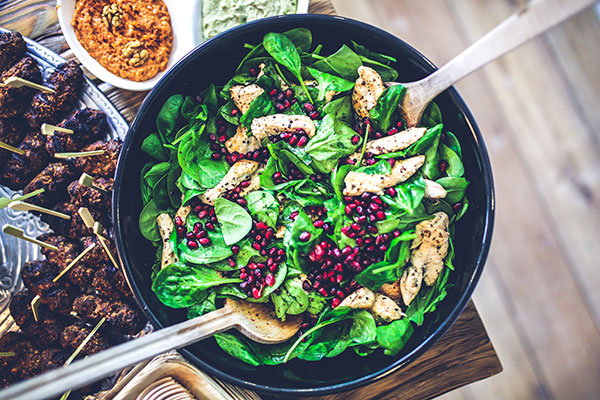Healthy eating doesn’t necessarily be a not-so-much fun ordeal.
It is not about strict dietary limitations, staying unrealistically thin, or depriving yourself of the foods you love. Rather, it’s about feeling great, having more energy, improving your health, and stabilizing your mood.
If you feel overwhelmed by all the conflicting nutrition and diet advice out there, you’re not alone. It seems that for every expert, who tells you a certain food is good for you, you’ll find another saying exactly the opposite. But by using these simple tips, you can cut through the confusion and learn how to create a tasty, varied, and nutritious diet that is as good for your mind as it is for your body.

Healthy eating – What to eat?
Eat Mostly Plants, Especially Beans
Science has found that legumes were the most important dietary predictor of survival among the elderly, regardless of their ethnicity. For every 20-gram increase in daily pulses intake, they found a 7 to 8% reduction in mortality hazard ratio.
It’s hard to find a more perfect food than dried beans, peas or lentils. They are an excellent source of protein, vitamins, minerals and complex carbohydrates. They’re also very low in fat. Additionally, a single cup of beans contains roughly 16 grams of fibre which increases satiety and helps to lower cholesterol.

Load up your calories
Don’t get me wrong there. I meant eat “breakfast like a king; lunch like a prince; dinner like a pauper.” Research supports front-loading your calories among the first meals of the day and making dinner your smallest meal.
It’s fun to cook our own food
Cooking at home allows you to control the ingredients and you’re likely to eat a lesser variety of foods in a single meal. Turn on your favourite music and keep going.
Eating out encourages you to try more food, which increases consumption. Compared to sitting down at a restaurant, cooking requires you to stand, mix and chop, boosting your daily activity.
Additionally, cooking at home allows you to focus on adding in more fruits and vegetables. Compared to western diets, plant-based ones have been shown to slow the effects of aging by fighting free radicals and preventing cell damage.

When to eat
Aim to eat every 3-4 hours
Most people eat three meals and one snack, while others may prefer four smaller meals; you’re free to find the combination that works best for you. Timing your meals in this way will improve your fat loss by preventing excess insulin. You should also enjoy your meals at the same time every day.

Eat within 1 hour of rising
When you skip breakfast, you lose its stimulating benefits on your metabolic rate. You also become more likely to eat unbalanced meals, more calories, and larger amounts of saturated fat throughout the day. Missing out on a healthy morning meal also increases stress hormones.
What to avoid eating for breakfast
Foods like black plum, Indian plum, tamarind, coconut, products made with sesame seeds, mango, banana, Indian goose berry should not be taken for breakfast.

Start the day with protein
For better appetite control throughout the day, try combining your starchy carbs at lunch, dinner, or after your workouts rather than at breakfast. Stick to eggs or smoothies for breakfast and you’ll eat less throughout the day. It is a good idea to have a sour fruit like a pomegranate or grapefruit, according to Ayurveda, but never a banana.
Always eat within 45 minutes of finishing your workout
This meal or snack is the only one of the day that should not contain much fat and should be higher in carbohydrates. Healthy eating – For example, have a smoothie made with juice, fruit, and protein powder, but no flaxseeds or oil.
Never do your weight training on an empty stomach
You will need energy from your foods to perform optimally. You may, however, complete your cardio before eating if your session will be less than 30 minutes.
Focus on your food
Do not eat while you are doing anything else (i.e., watching TV, working, surfing on the computer, etc.). Focus on chewing your food and relaxing while you eat.

Eat protein first
Eat the protein on your plate first to help speed the signal to your brain that you are full.
Healthy eating – Never eat within 3 hours of bedtime
Eating too close to bedtime raises your body temperature, increases blood sugar and insulin, prevents the release of melatonin, and cuts down on growth hormone release. All these factors interfere with the quality of your sleep and the natural fat-burning benefits of a good night’s rest.
Furthermore, sleep deprivation leads to more cravings and a greater likelihood of overeating the next day.
If you must eat before bed, opt for a light meal or snack that’s high in protein and low in carbohydrates and fat, such as a protein shake made with berries and water, salad with grilled chicken, or a shrimp and vegetable stir-fry.
Drink alcohol last
If you have alcohol or wine, do so after your meal to enhance the hormones involved in appetite control and digestion.

Before bedtime
Healthy eating – Drink a cup of warm milk, to which a pinch of turmeric powder is added, to have a good night of blissful sleep.
We always aimed for a healthy body. The time’s now. So, start with it.





